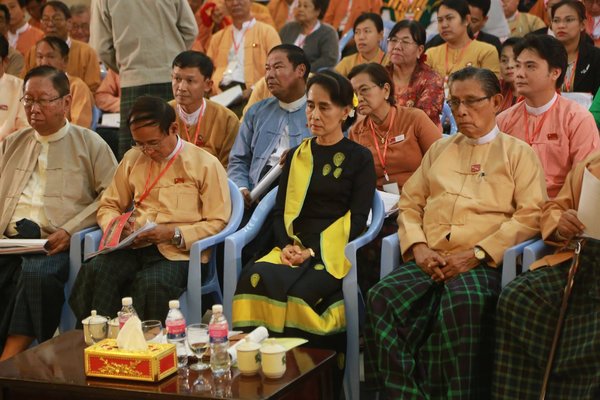The National League for Democracy (NLD) concluded its second congress of the year in Rangoon this weekend, announcing its intention to campaign vigorously for the 2015 general election, while maintaining efforts to enact constitutional reform.
Speaking to DVB on Monday, NLD spokesman Nyan Win said, “We cannot react yet, because there has been no confirmation about the election. First, we need the Union Election Commission to announce the date of the election. We are waiting. After that, we will issue our manifesto, and we will do our best for the 2015 election.”
The opposition party also said it would continue working for a nationwide peace and implementation of Rule of Law.
In a statement released on Sunday at the end of the two-day summit in Rangoon, the party said it supports a genuine dialogue for peace and national reconciliation, and plans to launch a “campaign year” ahead of the elections, which are expected to be held between October and December next year.
The NLD refused to compete in the previous general election, in 2010, maintaining that polls would not be free and fair.
Twenty years earlier, the party swept to victory with a landslide win in the 1990 elections – led by its charismatic new leader Aung San Suu Kyi – winning 392 of the 492 seats.
[related]
The party was never allowed to take power by the military junta, which later insisted the elections were never meant to form a parliamentary government, but rather to form a “parliament-sized constitutional committee’ to draft a new Constitution. Several NLD leaders were arrested and imprisoned around this time, among them vice-chairman Tin Oo, co-founder Win Tin, and Chairperson Suu Kyi, who subsequently served more than 15 of the next 21 years under house arrest.
Having boycotted national elections in 2010, the NLD returned to the political fold shortly after President Thein Sein came into power the following year, when he launched a series of economic and political reforms.
The NLD re-registered and competed in by-elections in April 2012, winning 43 of the 46 constituencies up for grabs. Suu Kyi represented the party in the Rangoon township of Kawhmu, easily winning a seat in the lower house.
The NLD has focused a year-long campaign aimed at amending the 2008 Constitution, because, it says, Article 436 allows the military effective veto power over any constitutional reform.
The Constitution also bars Suu Kyi from running for the presidency or vice-presidency, due to a clause, Article 59(f), which prohibits any candidate who has direct family members with foreign citizenship from seeking the post.
Suu Kyi’s deceased husband, Michael Aris, was English, and their two sons have British citizenship.



